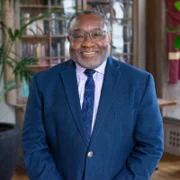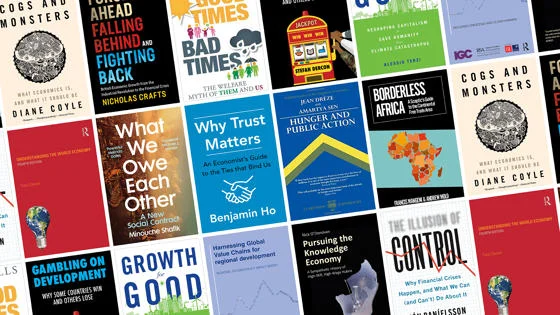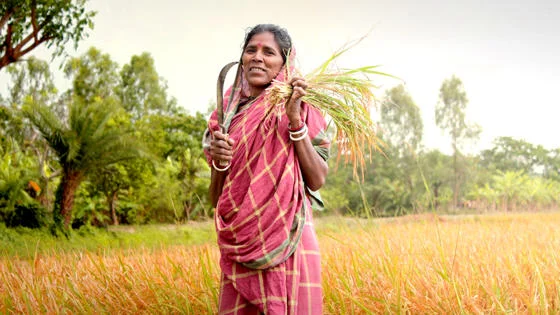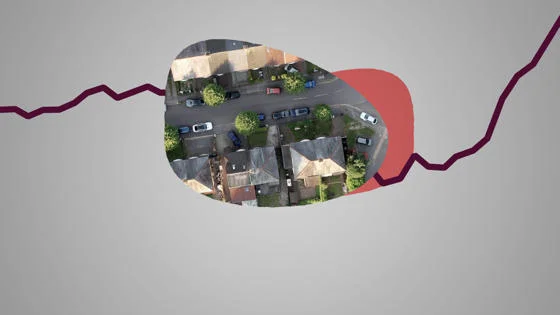Understanding African trade is key to helping its development
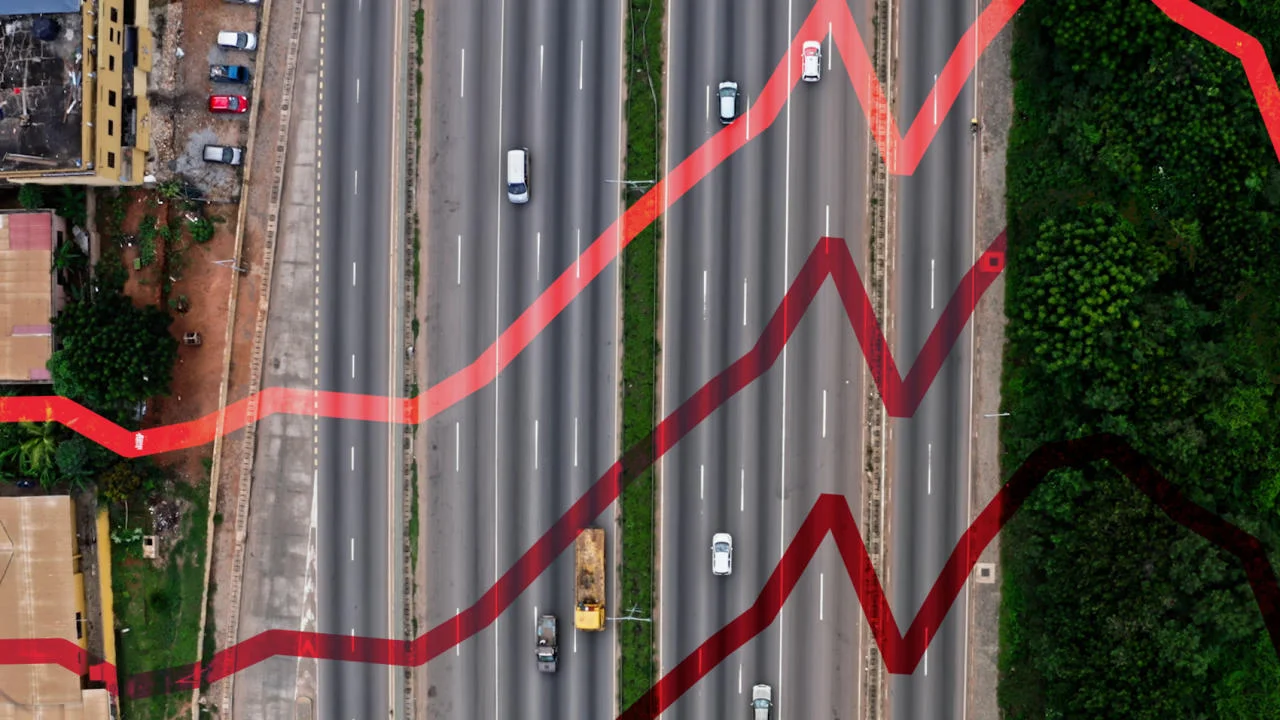
Contents
Africa is currently home to 1.3 billion people, a figure projected to rise to 2.75 billion by 2060 when the continent is forecast to have a combined annual output of $16 trillion and an increasingly middle-class market. And yet, although the continent will, in just 40 years, have a market with more people than India and China combined, there is little mainstream discussion of its trading practices and partnerships.
It is this gap that Professor David Luke, Professor in Practice and Strategic Director of the Firoz Lalji Institute for Africa at LSE, aims to address in his new book, How Africa Trades, published by LSE Press in Spring 2023.
A specialist in African trade policy, and former head of the African Trade Policy Centre at the UN Economic Commission for Africa, Professor Luke’s aim is three-fold. "First, to demystify African trade policy and promote a deeper and broader understanding of how trade impacts the lives of ordinary Africans and the continent’s development aspirations. Second, to provide up-to-date information that is easily reachable through open access publication on Africa’s trade data, trade negotiations, trade agreements and policy priorities, with analysis for clarity. And third, to empower policymakers, stakeholders, scholars, and others to interrogate the effectiveness of trade agreements and policy choices including the implementation dimensions from a normative perspective that is pro-development, inclusive and gives precedence to overcoming pervasive poverty on the continent".
"My experience in the UN", he continues, "was that people in development seem reluctant to talk about trade, which is seen as too technical, something of an esoteric specialisation. I found this to be strange, because at the same time, policymakers in Africa and development partners are talking about private sector reform, competitiveness, investment, jobs, livelihoods, the wellbeing of people, and so on. But trade - what makes it all happen - is somewhat left out of the picture."
One reason for this, Professor Luke believes, is that development in the sense of the inclusive, sustained transformation of economies is marginalised in the traditional academic disciplines that focus on trade policy such as international economics, international relations and international law, while development studies disciplines marginalise trade policy. "Expertise at the moment is very siloed - looking at different aspects of trade, but not really pulling it all together to get a coherent picture on trade and development," he explains. "But if you're looking at the poorest continent – Africa - you need to understand all these different aspects - the trade agreements, the border and behind the border issues, the economics of trade, political dynamics, formal and informal trade and how trade interacts with development – and so that was the motivation behind the book."
To understand "how Africa trades", the researchers first looked at what Africa trades, accessing data from a range of sources including the IMF, UNCTAD, the World Bank, and sources of usually unrecorded informal cross-border trade to uncover the composition of Africa’s trade in goods and services within and outside the continent. Interrogating what that trade means in turn took the work to the voices of African diplomats, ambassadors at the World Trade Organization (WTO), negotiators, civil society activists, lobbyists and policymakers.
What Africa trades is as important as who it trades with
Analysis of the data revealed a detailed picture of trading relationships with African countries, both between themselves and the rest of the world. While the EU is Africa’s biggest trading partner, followed by China and then intra-African trade, the researchers also examined Africa’s trade with the US, UK and emerging economies such as India, Brazil and Turkey. The findings are instructive for those seeking to develop trading partnerships with the continent.
"We first looked at what Africa trades and found a clear difference in the type of trade being carried out between African countries and with the rest of the world," explains Professor Luke. "Trade with the rest of the world in goods is mainly commodities, and in services, mainly tourism, while intra-African trade - the trade between African countries - is more diversified in value-added goods such as manufactures and processed food and services such as transport services, financial services, business services etc. But intra-African trade is small accounting for only 18 per cent of Africa’s total trade. We found that over 60 per cent of this trade, although small, is diversified while Africa’s trade with the rest of the world is about 80 per cent commodities, with a heavy concentration in minerals and fossil fuels."
"In fact, manufactures", he continues, "are the largest type of export between African countries – accounting for 45 per cent of all formal intra-African trade. Foodstuff exports are also more significant, amounting to a fifth of trade between African countries. These 'formal' figures miss some of Africa’s trade which flows across contiguous borders informally and unrecorded. Recent estimates are that such informal trade flows account for the equivalent of between 7 and 16 per cent of formal intra-African trade flows. Much of that comprises foods and basic consumer goods. Informal trade is an expression of pervasive poverty and tends to be skewed towards women."
The problem with this type of partnership is one of trade diversion - it can potentially displace goods that Africa can produce itself, which is something we’re already seeing
Investment data were also found to be a mirror of the trade statistics. The investment stock of the three largest economies, the US, China and the EU revealed an excessive concentration in mining and extractive sectors associated with fuels and metals that is not representative of their investments elsewhere in the world. This matters, Professor Luke explains, because commodities tend to be subjected to extreme price volatility, liable to rent seeking and elite capture, and the extraction of value through illicit financial flows. "Commodities create less jobs," he adds. "Mining, for example, uses a lot of capital equipment, but doesn’t need that many people. Whereas, when you are producing things, agriculture, processing agriculture, and so on, you are creating more jobs. This has huge implications for development and the workforce. In agriculture in particular, we find that there are more women involved in processing food, while manufacturing can create jobs for African youth".
"It's important to link jobs to trade, especially in the African case," he adds "because the demographics suggest that, currently, Africa has around 252 million youth (aged 15-24 years) that need to be absorbed in productive activities. The demographic issue is very important to relate, both to development, and in terms of how trade impacts the economy, creates jobs, incomes, and so on."
Further, the trading relationships between Africa and the rest of the world were found to be asymmetrical – with Africa exporting basic commodities and importing mainly manufactured goods. "The problem with this type of partnership is one of trade diversion - it can potentially displace goods that Africa can produce itself, which is something we’re already seeing," continues Professor Luke.
These asymmetrical trading partnerships therefore leave Africa at a disadvantage, Professor Luke argues, with countries with a stronger manufacturing base trading with Africa with its own weaker manufacturing base and displacing what they can produce.
On top of this, some major trading partners, especially the EU, have different trade agreements with African countries depending on whether they are north of the Sahara or south of the Sahara, developing or least developed. This creates a hard border for trade with the EU between African countries, which undermines Africa’s own efforts to establish common trade rules across the continent, and disincentivises the emergence of supply chains between African countries. The UK, by copying the EU’s approach after Brexit, has not made this problem any easier, says Professor Luke, who last year submitted evidence to the UK’s All-Party Parliamentary Group on Africa.
Intra-Africa trade is more diverse and can drive Africa’s transformation
Common trade rules across the continent is key for tapping into the enormous size of the collective African market, building upon its potential for further diversification, attracting investors in non-traditional sectors, and achieving competitive economies of scale. This is part of the rationale of the African Continental Free Trade Area (AfCFTA) Agreement that entered into force under African Union auspices in 2019. "You always trade with your neighbours because trade costs are lower, so this is a principle that has existed throughout time," says Professor Luke.
"If fully implemented," he adds, "liberalised trade on the African continent offers an incentive for the restructuring of African economies through diversification, agricultural and industrial development. The trade deal offers a framework for continent-wide reforms to bring trade costs down, undertake border reforms and foster institutions and practices of modern trade governance." Economic modelling suggests the deal could be worth as much as $450 billion for the continent by 2045. The biggest prize, he explains, is that the trade deal offers African countries a credible pathway to follow the play book of successful development experiences in countries that attained rapid transformation and diminished levels of poverty within a few decades through carefully designed trade policy interventions, effective institutions and other economic and social policy reforms.
External and internal hurdles
Professor Luke foresees two hurdles that need to be addressed for the trade deal to be successful: one external to Africa and the other internal. The external hurdle is the need for Africa’s trade partners to offer a trade deal that minimises the risk of trade diversion – the displacement of good and services that can be produced in Africa. The internal hurdle is for African policymakers and stakeholders to ensure implementation of the AfCFTA, to sustain border and behind the border reforms, and for Africa to speak with one voice when negotiating with bilateral partners or at a global forum such as the WTO.
"In the book we argue that the United States Growth and Opportunity Act (AGOA), a trade concession to sub-Saharan African countries that was enacted during the Clinton Administration and has since provided a policy framework for Africa’s trade with the US – with bipartisan support that transcends the dysfunctionality of US politics - is the model to follow. AGOA is not perfect and even the US recognises the need to overcome its bureaucratic division between North Africa and sub-Saharan Africa and to buttress it with complementary investment and trade facilitation initiatives. We suggest ways in which AGOA could be reformed. But AGOA provides African countries with breathing space as it does not require reciprocal market access as the EU (and UK) trade agreements do or China which offers minimal trade concessions. What is more, the US successfully obtained a waiver from the WTO to discriminate in this way in favour of African countries."
He argues that if external market access is secured for Africa’s exports without the need for reciprocity, it incentivises African countries to seek trade opportunities with each other and mitigates the risks of trade diversion. Economic modelling evidence is cited in the book to show that after full implementation of the AfCFTA, gains for Africa would essentially be concentrated in intra-African trade which could see an increase of up to 33.8 per cent by 2045, as compared to a baseline without the AfCFTA. Yet what is most significant is where these gains would be, with manufacturing and Africa’s long-overdue industrialisation benefiting most. "This data-driven projection may be considered to be a judicious timeframe for a transitional period that allows a sequencing of AfCFTA implementation followed by reciprocal market access," he suggests. "This will help African countries to build productive capacities and achieve their potential for strong and diversified growth in intra-African trade with inclusive and transformational consequences."
...African countries should work together in their bilateral partnerships and at the WTO.
As regards the internal hurdles, the key, Professor Luke argues, will be to build and sustain political coalitions for implementation of the AfCFTA and trade reforms. There is already strong political momentum behind the deal with all but one (Eritrea) of the members of the African Union being signatories. COVID-19 threw unprecedented economic difficulties upon the continent, yet despite this the AfCFTA has retained and even built upon attention as a tool for transforming Africa. But implementation remains a hurdle. In recognition of this, the African Union decided to name the year 2023 the year of accelerated AfCFTA implementation.
When it comes to speaking with one voice, experience has shown that African countries are vulnerable to being outmanoeuvred in trade negotiations and in their engagement with their better resourced trade partners. In geo-economics and geo-politics, individual African countries lack influence on their own to achieve meaningful outcomes that impact their development prospects.
"When we looked at the WTO," Professor Luke continues, "we found that African countries are somewhat disadvantaged, because, altogether, their share of world trade is only about 2 per cent – which is another reason why in there is a need to rethink these current asymmetrical relationships."
Because African trade shares are so small and so highly concentrated in commodities, they tend not to use the WTO for dispute settlement, he explains: "However, even if they did, the result would be like shooting themselves in the foot, because although WTO rules would allow them to reciprocate - to inflict some trade-related pain on the other country – their trade is so small that this would have no impact."
He continues: "so, we analysed the data to show that for all the disputes at the WTO, the African countries really have been bystanders. We are also able to show that, and even on the negotiations side, many of the proposals that the Africans bring forward as ways to rebalance some of the rules to make them more development-friendly have not gone anywhere."
"A major internal hurdle to overcome," he notes "is that the African countries should work together in their bilateral partnerships and at the WTO. The African Union Commission has no mandate to negotiate on behalf of African countries. The book recommends that this should change". Looking to the future, one of the emerging issues that will impact how Africa trades concerns initiatives to decarbonise economies and the role that border adjustment measures can play in reducing the risk of carbon leakage. "It is essential that from this early stage, African countries are able to shape new global rules on trade and climate. They will only be able to do so if they act together," he says.
"The stakes are high," he concludes. A reliable revenue stream from trade is critical for development finance and sustainable debt management. Transforming how Africa trades will unlock structural changes in African economies that have proved elusive so far.
Professor David Luke was speaking to Jess Winterstein, Deputy Head of Media Relations at LSE
Download a PDF version of this article

